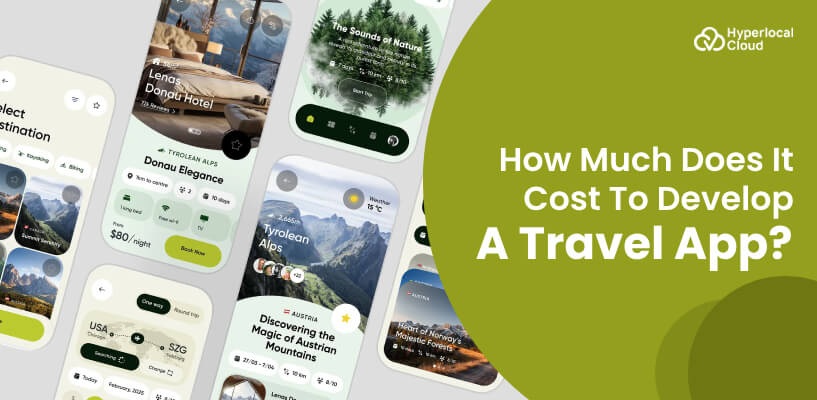Travel App Development Cost: Detailed Breakdown

Technology in the travel industry has evolved from its roots. The era of digitalization and high-end technology made the transportation and tourism business more approachable. Therefore, traveling is no longer a major problem. It only takes a few clicks on your smartphone to get to any place you want to go, any hotel you want to stay at, and any restaurant you want to try. However, some of the research suggests that the projected growth rate of travel app development is continuously increasing between 2025 and 2029 by a total of $0.6 billion.
So, businesses that are ready to build their own travel apps need to try out an experienced mobile app development company. Additionally, this blog will provide a complete breakdown of the cost to build a travel app.
What is a Travel App?
Any smartphone or web application created to help users plan, book, and manage their travel experiences is called a travel app. These applications provide a number of functions to assist travelers in finding discounts, scheduling lodging and flights, planning itineraries, and gaining access to up-to-date travel information. A travel app like Airbnb, TripIt, Skyscanner, etc., is the most demanding and popular travel guide application. With the white label travel portal, businesses can easily target the right audience and build a huge user base.
What is the Working Model of a Travel App?
The travel app facilitates users’ convenient planning, booking, and managing of trips and journeys. When it comes to working, a travel app offers safe order options, user accounts, search and discovery, and real-time updates. Go through the points below to get a brief overview of the working model of a travel app.
1. User Account / Profile
The Travel app allows users to check order history, determine preferences, create accounts, and manage them. This allows sewing tips and rapid processes such as money transfer and re-booking.
2. Search and Discover
Users can search directly through the app for flights, hotels, rented cars, tourism, and other travel services. It often uses GPS and place data to provide information about attractions or nearby services.
3. Booking and Reservation
Apps enable safe ordering and reservation options for flights, hotels, and other services. They handle the transaction using a secure payment port.
4. Itinerary Management
The Travel app often involves features to organize and manage travel plans in the same location. This may include confirmation of aircraft, hotel booking, and other travel details.
5. Real-time Updates and Notifications
Real-time updates and push notifications typically inform users about flight conditions, weather updates, and travel advice. Users can also access local attractions, internal formula tips, and events.
6. Personalized Recommendations
Apps use data analysis to customize suggestions based on user preferences and travel history. This may include recommending destinations, activities, or restaurants based on previous behavior.
Explore the Potential Features of a Travel App
Here are some key features you should consider when entering the business.
1. Search Bar
You should focus most of your attention on the bar’s search functionality. When creating a travel booking app, make sure to account for the full range of search terms and input fields that people typically employ. This will make it easy for people to find their favorite destination.
2. Price Comparison
Customers looking for a good deal will appreciate it if you provide ways to compare prices. Your site’s new price comparison function saves customers money on airfare, lodging, and vacation packages. To enable this feature in your travel app, you can integrate a flight and hotel API that provides real-time price comparison data.
3. Payment Gateways
Accepting payment is a necessary part of the payment process unless you offer travel guides or virtual reality tours. The ideal mobile travel app would offer its users various secure payment options, such as debit card/credit card, UPI, digital wallets, and cash on delivery.
4. Destination Guide
This feature provides users with information about their destination, including things they do and enjoy, food locations, and local attractions. It may also include user reviews and recommendations from other passengers.
5. Maps & Navigation
This feature provides users with maps and instructions for navigating the destination. It may include features such as offline maps, real-time traffic updates, and public transport information.
6. In-app Chat Support
It allows users to communicate directly with customer support or travel agencies in the app. Features such as live chat, telephone support, or email support may be available.
How much does Travel App Development Cost?
The average cost of developing a travel app starts from around $5,000. But this is not the exact cost; the cost might differ depending on many factors. Some of the factors are discussed below, giving you an exact insight into the development cost. Building a travel app involves several factors directly impacting the total development cost. If you’re a B2B service provider or business investing in app development, understanding these cost-driving elements is essential for accurate budgeting and planning.
1. App Features and Functionality
The higher the development cost, the more complex the features (e.g., real-time booking, GPS tracking, in-app payments, AI-based recommendations).
2. Platform Choice
Developing for a single platform costs less than building for both. However, a cross-platform solution can reduce long-term maintenance costs.
3. UI/UX Design
A user-friendly and visually appealing design adds value but may require more time and design expertise, impacting cost.
4. Third-party Integration
APIs for payments, hotel/flight bookings, weather updates, or maps can add extra licensing and overall development costs.
5. Development Team
A solid backend ensures your app runs smoothly. Costs depend on the server architecture, database, scalability needs, and hosting options.
6. Location
Hiring developers from regions like North America or Western Europe is usually more expensive than working with teams in Eastern Europe, India, or Southeast Asia.
7. Security and Compliance
If your app handles personal or payment information, implementing strong security and regulatory compliance (GDPR, PCI-DSS, etc.) is necessary, and it adds to the cost.
8. Maintenance and Updates
Ongoing maintenance, bug fixes, and feature updates are recurring expenses post-launch. Thus, these will reduce the chances of unwanted errors and improve the app’s overall performance.
Unleash the Factors that Reduce the Development Cost of a Travel App
Cutting costs doesn’t mean compromising on quality. Here are smart ways businesses can reduce development costs while ensuring the app delivers value:
1. MVP Approach (Minimum Viable Product)
Start with core features. Validate the idea, gather user feedback, and expand in later versions.
2. Use of Ready-Made Templates and Modules
Leveraging existing frameworks and templates can save time and lower UI/UX design costs.
3. Cross-Platform Development Tools
Technologies like Flutter or React Native allow one codebase for both iOS and Android, reducing development time and cost.
4. Outsource Development to Cost-Effective Regions
Partnering with skilled offshore development teams can deliver high-quality results at lower rates.
5. Cloud Infrastructure and Backend-as-a-Service (BaaS)
Using scalable cloud services like AWS, Firebase, or Azure reduces infrastructure setup and management costs.
6. Agile Development Methodology
Agile methodology allows for better project control, minimizes rework, and ensures quicker delivery of useful iterations.
What are the Business Benefits of a Travel App Development?
By building a travel app, you provide a convenient way for users to plan their journey easily. A travel app is an umbrella where a user can get multiple solutions. Providing various solutions at one stop will help your business grow. Here are some advantages you can provide for your global users.
1. Global Reach and Accessibility
The users will easily access everything from the location to hotels and easy booking options. The easy accessibility of all things will help the user, and businesses will make more engagement on the platform.
2. Customer Data and Insights
When planning a trip, how often do you wonder if you can include customer data and insights first? Most use travel apps like Airbnb, which provide fantastic images of hotels and places before arriving. Although images are included in a traditional travel service, keeping them in a program you can access quickly and easily is more convenient.
3. Brand Recognition and Marketing
Promoting and advertising an online business has quickly become common in recent years and is considered a powerful way to increase the company’s profile and increase sales. Therefore, besides providing information for vacationers, mobile apps help companies maintain relationships with their customers. The main advantage of a major is that it enables direct communication with customers so that companies can learn about their preferences and tailor their offers accordingly.
4. Better Trip Planning
Mobile apps for the travel and tourism industry make trip planning a breeze for customers. Pictures and videos can help them decide where to go first. Almost 66% of travellers say they have watched travel videos before visiting a new location.
5. Less Paperwork
One of the things that makes people think twice about booking a trip or specifically choosing your services is the amount of paperwork involved. Thanks to the travel app, however, paperwork can be minimized or eliminated entirely. Users can fill out the form in the comfort of their own homes without being bothered.
6. Customization and Flexibility
Give each of your customers the opportunity to leverage the customization option to set a theme, UI/UX design, platform choice, etc. The app helps you guess your customers’ needs and wants so you can fulfill their expectations. Thus, this will automatically enhance the customer base and interaction with the travel app.
7. Customer Loyalty & Engagement
Customer retention has never been more challenging because hundreds of competitors operate in the same market. But with every problem comes a solution, which means going digital here. Your company’s mobile app can boost customers’ loyalty to your brand. Stay in touch with your clientele by sending them regular updates, special offers, greeting cards, and invitations to your business.
Avail the Revenue Generation Model of a Travel App
For B2B marketplaces or service providers, travel apps can be strong revenue generators. Below are the main models through which businesses can earn income:
1. Commission-Based Model
Earn a percentage on every booking made through the app, whether it’s flights, hotels, car rentals, or tour packages.
2. Subscription Plans
Offer users or partner businesses premium services through tiered subscriptions (e.g., advanced analytics, personalized support).
3. In-App Advertising
Generate income by displaying targeted ads for travel-related businesses, hotels, or insurance providers.
4. Affiliate Marketing
Partner with airlines, hotels, or activity providers and earn through affiliate links when users make bookings.
5. Featured Listings and Sponsored Content
Allow businesses to promote their services within the app for a fee – ideal for hotels, tour operators, or restaurants.
6. Data Monetization
Sell anonymized user data and travel insights (with proper consent and privacy practices) to marketers or travel industry analysts.
Why Choose Hyperlocal Cloud for a Travel App Development?
As a leading on-demand app development company, we have a team of experts who deliver an advanced mobile app solution. Now, no further confusion should be left about building an online travel marketplace. You just need to contact the experts at Hyperlocal Cloud Inc. to get the support.
1. Experienced Developers
We are a team of 150+ developers with over a decade of experience developing high-end applications for industries such as travel and tourism, hospitality, real estate, healthcare, and automobiles.
2. 100% Transparency
We provide 100% transparency before the deal, during the project development, and after the application deployment. The primary reason behind Hyperlocal Cloud Inc.’s success is our goodwill and relationship with our clients.
3. Retention Rate
Hyperlocal Cloud boasts a high retention rate of over 80%. The good number is due to our high-end service, flexible & cost-effective rates, experienced developers, and highly dedicated project managers.
4. No Hidden Charges
We do not charge hidden fees for our service. We operate with 100% transparency and adhere to international business standards to maintain our reputation.
5. On-time Project Delivery
With dedication and teamwork, we at Hyperlocal Cloud Inc. deliver projects to the clients on time. This approach is a plus point of our proven experience in on-demand mobile app development.





